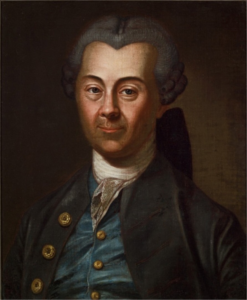God in the storm
(Poet's title: Gott im Ungewitter)
Set by Schubert:
D 985
for SATB chorus and piano[June 1816]
Du Schrecklicher, wer kann vor dir
Und deinem Donner stehn?
Groß ist der Herr, was trotzen wir?
Er winkt, und wir vergehn.
Er lagert sich in schwarzer Nacht,
Die Völker zittern schon:
Geflügeltes Verderben wacht
Um seinen furchtbarn Thron.
Rotglühend schleudert seine Hand
Den Blitz aus finstrer Höh’:
Und Donner stürzt sich auf das Land,
In einer Feuersee:
Dass selbst der Erde fester Grund
Vom Zorn des Donners bebt,
Und was um ihr erschüttert Rund
Und in der Tiefe lebt.
Den Herrn und seinen Arm erkennt
Die zitternde Natur,
Da weit umher der Himmel brennt
Und weit umher die Flur.
Wer schützt mich Sterblichen, mich Staub,
Wenn, der im Himmel wohnt
Und Welten pflückt wie dürres Laub,
Nicht huldreich mich verschont?
Wir haben einen Gott voll Huld,
Auch wenn er zornig scheint:
Er herrscht mit schonender Geduld,
Der große Menschenfreund.
You who instil terror, who can
Stand before you and your thunder?
The Lord is great! How can we defy him?
He makes a sign, and we become nothing.
He lies down in the darkness of the night;
The peoples of the world are already trembling:
Winged destruction is on the look-out
Around his terriflying throne.
His hand, glowing red, hurls
The lightning from the dark heights:
And thunder is poured over the land
Into a sea of fire:
With the result that the fixed foundation of the earth
Shakes with the thunder’s wrath,
All around trembles
As does everything that lives in the deep.
The Lord and his arm are acknowledged
By trembling nature,
Since far into the distance the sky is burning
Along with the meadows all around.
Who is going to protect me, mere mortal, mere dust,
When he who lives in heaven
And who plucks worlds as if they are dry leaves,
When he refuses to spare me despite his mercy?
We have a God of mercy,
Even when he appears to be wrathful:
He reigns with forgiving patience,
The great friend of human beings.
All translations into English that appear on this website, unless otherwise stated, are by Malcolm Wren. You are free to use them on condition that you acknowledge Malcolm Wren as the translator and schubertsong.uk as the source. Unless otherwise stated, the comments and essays that appear after the texts and translations are by Malcolm Wren and are © Copyright.
☙
Themes and images in this text:
Earthquakes Fire Hands Leaves and foliage Night and the moon Red and purple Storms Thunder and lightning
When does a paradox become a contradiction? Yes, we all know that appearances can deceive and that we should not make superficial judgements about character based on limited evidence. What then, are we supposed to make of the coherence of this strange text? Six strophes insist on the overwhelming power of God in his wrath and the relative insignificance of human beings (mere dust) in relation to Him. Then comes – what is it? The reveal? The ‘moral of the story’?’ The opposite of the ‘sting in the tale’? It appears to be just a bald assertion (with hardly any supporting evidence) that He is more loving than he appears.
Is the intention to build up the fear and awe to such an extent that we become all the more grateful for the mercy we have been shown (despite our unworthiness)? The text might even be seen as an encapsulation of the Lutheran approach to religious history; the first six stanzas present the God of the Old Testament, who has imposed on us a Law that we are unable to obey. The despair and terror that result become the precondition for our ability to accept the grace offered in the New Testament or Covenant, in which the strict God of law and power is revealed as a loving Father.
☙
Original Spelling Gott im Ungewitter Du Schrecklicher, wer kann vor dir Und deinem Donner stehn? Groß ist der Herr, was trotzen wir? Er winkt, und wir vergehn. Er lagert sich in schwarzer Nacht; Die Völker zittern schon: Geflügeltes Verderben wacht Um seinen furchtbarn Thron. Rothglühend schleudert seine Hand Den Blitz aus finstrer Höh: Und Donner stürzt sich auf das Land, In einer Feuersee: Daß selbst der Erde fester Grund Vom Zorn des Donners bebt, Und was um ihr erschüttert Rund Und in der Tiefe lebt. Den Herrn und seinen Arm erkennt Die zitternde Natur, Da weit umher der Himmel brennt Und weit umher die Flur. Wer schützt mich Sterblichen, mich Staub, Wenn der im Himmel wohnt, Und Welten pflückt, wie dürres Laub, Nicht huldreich mich verschont? Wir haben einen Gott voll Huld, Auch wenn er zornig scheint: Er herrscht mit schonender Geduld, Der große Menschenfreund.
Confirmed by Peter Rastl with Schubert’s source, Sämmtliche Poetische Werke von I. P. Uz. II. Theil. Wien. Gedruckt für Franz Schrämbl bey Ignaz Alberti. 1790. [Sammlung der vorzüglichsten Werke deutscher Dichter und Prosaisten. X. Band.] pages 160-161; with Sämtliche Poetische Werke von J. P. Uz. Erster Band. Leipzig in der Dykischen Buchhandlung. 1768, pages 333-334; and with Poetische Werke von Johann Peter Uz. Zweyter Band. Nach seinen eigenhändigen Verbesserungen herausgegeben von Christian Felix Weisse. Wien. Bey J. V. Degen, Buchdrucker und Buchhändler. 1805, pages 265-266.
To see an early edition of the text, go to page 160 [180 von 294] here: http://digital.onb.ac.at/OnbViewer/viewer.faces?doc=ABO_%2BZ165356207


